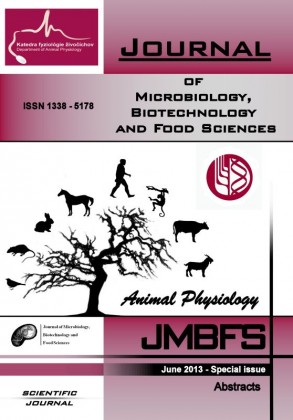THE EFFECT OF AMYGDALIN ON PORCINE OVARIAN GRANULOSA CELLS IN VITRO
Keywords:
amygdalin, porcine ovarian granulosa cells, progesteroneAbstract
Amygdalin is a natural plant compound occurring in the seeds of apricot, almond, apples, peaches, and other rosaceous plants. Its anticancer, anti-inflamatory activity and other medicinal benefits have been known for many years. Amygdalin is composed of two molecules of glucose, one of benzaldehyde, which induces an analgesic action, and one of hydrocyanic acid, which is an anti-neoplastic compound. The aim of this in vitro study was to investigate the secretion activity (steroid hormone-progesterone) of health porcine ovarian granulosa cells (GC) after amygdalin administration. Granulosa cells from non-cycling and cycling porcine ovaries were incubated with amygdalin at the selected doses 1, 10, 100, 1000 and 10 000 µg/mL for 24 hours and compared to the control without amygdalin administration. The release of progesterone by GC from non-cycling and cycling porcine ovaries were assessed by ELISA. The results from our investigation showed that amygdalin did not significantly (P≥0.05) affect on the release of progesterone by porcine granulosa cells from health non-cycling and cycling ovaries at our selected doses. In conclusion, the present results suggest that amygdalin do not cause changes in secretory activity (steroid hormone-progesterone) of granulosa cells in health porcine ovaries. These findings indicate our further research of amygdalin and its effects on animal reproductive cells.Downloads
Download data is not yet available.
Downloads
Published
2013-06-06
How to Cite
Halenár, M., Maruniaková, N., MedveÄová, M., & Kolesárová, A. (2013). THE EFFECT OF AMYGDALIN ON PORCINE OVARIAN GRANULOSA CELLS IN VITRO. Journal of Microbiology, Biotechnology and Food Sciences, 2(Abstracts special issue), 14. Retrieved from https://office2.jmbfs.org/index.php/JMBFS/article/view/7539
Issue
Section
Biotechnology
License
Copyright (c) 2013 Marek Halenár, Nora Maruniaková, MarÃÂna MedveÄová, Adriana Kolesárová

This work is licensed under a Creative Commons Attribution 4.0 International License.
All papers published in the Journal of Microbiology, Biotechnology and Food Sciences are published under a CC-BY licence (CC-BY 4.0). Published materials can be shared (copy and redistribute the material in any medium or format) and adapted (remix, transform, and build upon the material for any purpose, even commercially) with specifying the author(s).

